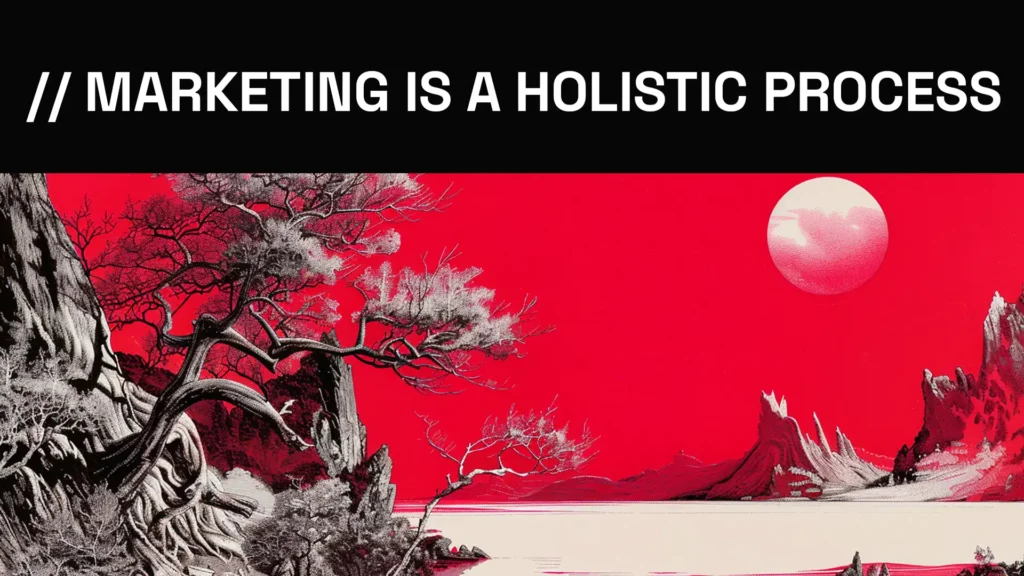TAKE YOUR BUSINESS TO THE NEXT LEVEL
Let us take marketing off your plate. Visit our pricing to learn more about working with Next Level.

Marketing has become incredibly complex in today’s fast-paced business world. Simply running Google Ads is no longer enough to attract and keep customers. The digital advertising space is fiercely competitive, with businesses fighting for attention across various channels. To succeed, you need a holistic approach that covers multiple channels, adapts to changing consumer behaviors, and navigates legislation and technology updates. If you don’t recognize and adapt to this new reality, your business could fall behind, lose market share, and even face bankruptcy.
The buyer’s journey is no longer a straight line from awareness to purchase. It’s now a maze of touchpoints, with consumers interacting with brands across different platforms and devices before making a decision. It can take up to 100 touchpoints before a conversion happens. This complexity is driven by the growth of digital channels, social media, and consumers who seek information from multiple sources.
To navigate this complex landscape, you need an omni-channel marketing approach. This means creating a seamless and consistent experience across all channels, from physical stores to online platforms, social media, and mobile apps. By providing a cohesive brand message and a unified customer experience, you can build trust, foster loyalty, and guide consumers through the complex buyer’s journey.
As data privacy and security concerns have grown, governments and tech companies have responded with legislation and updates that significantly impact marketing. The GDPR in Europe and the CCPA in the United States have set new standards for how businesses collect, use, and protect consumer data. These regulations have made it harder for marketers to rely on third-party data and required more transparency about data practices.
Tech updates have also affected marketing strategies. For example, Apple’s iOS 14 update introduced the App Tracking Transparency feature, which requires apps to get user permission before tracking their data across other companies’ apps and websites. This change has made it more challenging to target and retarget consumers effectively, as many users opt out of tracking.

To adapt, you need to focus on building first-party data through direct customer relationships. This can be done through loyalty programs, email marketing, and other strategies that encourage customers to share their data willingly. By relying on first-party data, you can create more personalized and effective marketing campaigns while complying with privacy regulations.

To stay competitive, you must embrace omni-channel marketing solutions. Omni-channel marketing creates a seamless and integrated customer experience across all channels and touchpoints. This approach ensures that customers receive consistent messaging and branding, no matter how they interact with your business.
By implementing omni-channel marketing solutions, you can better understand your customers’ preferences and behaviors, allowing you to create more targeted and personalized campaigns. This approach also enables you to collect valuable data from multiple channels, providing insights into customer journeys and enabling data-driven decision-making. Ultimately, omni-channel marketing solutions help you build stronger customer relationships, leading to increased loyalty, higher conversion rates, and improved overall marketing performance.
In the face of the cruel and changing conditions of the current marketplace, a robust and well-documented marketing strategy can serve as a guiding light. A comprehensive strategy outlines your company’s goals, target audience, competitive landscape, and the tactics and channels you’ll use to achieve your objectives. By having a clear plan in place, you can navigate the complexities of the modern marketing landscape with greater confidence and agility.
A well-crafted strategy helps you allocate resources effectively, prioritize initiatives, and adapt to changing market conditions. It also ensures that all team members are aligned and working towards common goals, fostering collaboration and efficiency. A documented strategy provides a benchmark to measure progress and make data-driven adjustments as needed. Essentially, a robust marketing strategy serves as a map, helping you chart a course through the often turbulent waters of the current marketplace.

The ability to adapt and remain flexible is crucial for business survival. As the Greek philosopher Heraclitus said, “The only constant in life is change.” This is especially true in marketing, where rigidity can lead to stagnation and failure. Just as a tree that can’t bend in the wind will eventually break, a business that can’t adapt to changing market conditions will struggle to survive.
To overcome the psychological roadblocks that prevent adaptation, you must cultivate a culture of continuous learning and experimentation. Encourage employees to stay up-to-date with industry trends, invest in training and development, and foster an environment that values creativity and innovation. By embracing a growth mindset and being open to new ideas, you can develop the agility needed to thrive in a dynamic marketplace.
Marketing must be approached as a holistic process in today’s complex and ever-changing business landscape. By embracing omni-channel marketing solutions, adapting to legislative and technological changes, developing a robust marketing strategy, and cultivating a culture of flexibility and continuous learning, you can navigate the challenges of the modern marketplace and thrive in the face of uncertainty. Those who fail to adapt risk being left behind as the business world continues to change. The key to success lies in understanding the intricacies of the buyer’s journey, leveraging data-driven insights, and maintaining a flexible and agile approach to marketing. With the right mindset and tools, you can not only survive but thrive in the face of the most challenging market conditions.
Let us take marketing off your plate. Visit our pricing to learn more about working with Next Level.